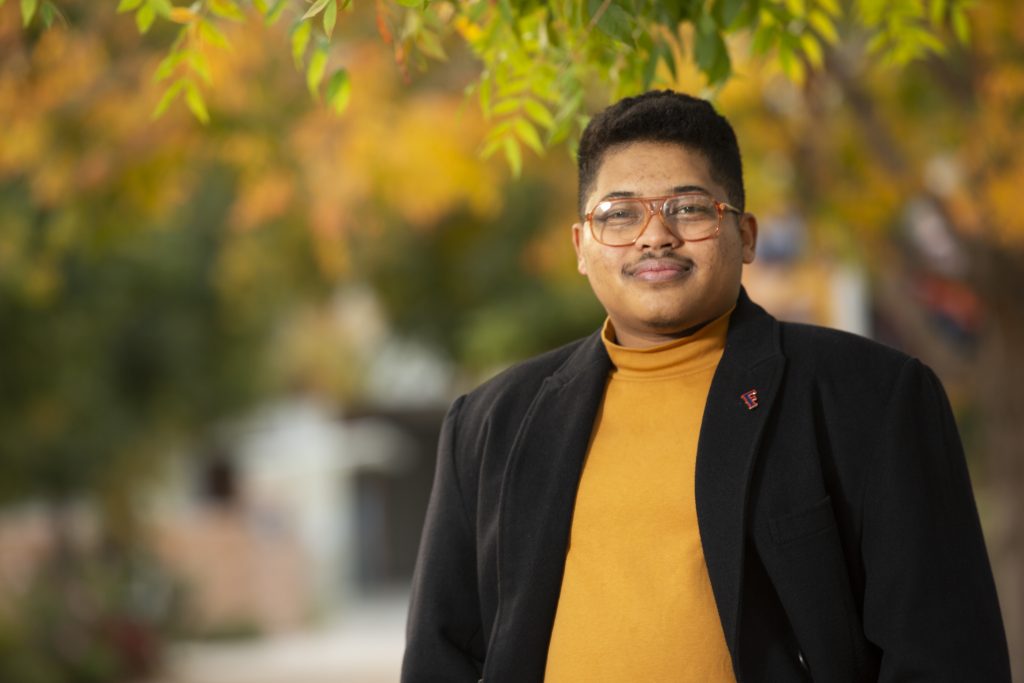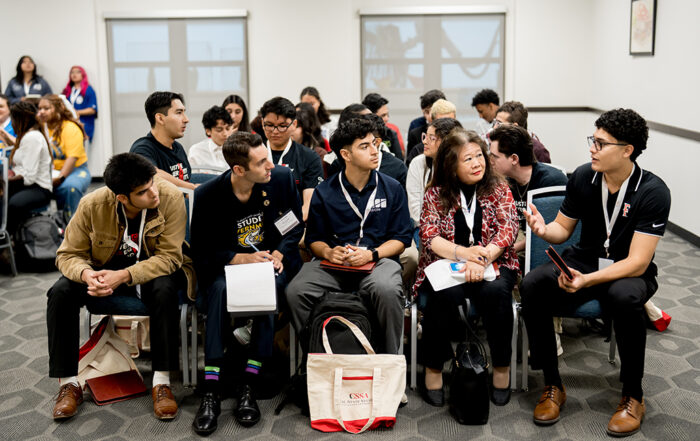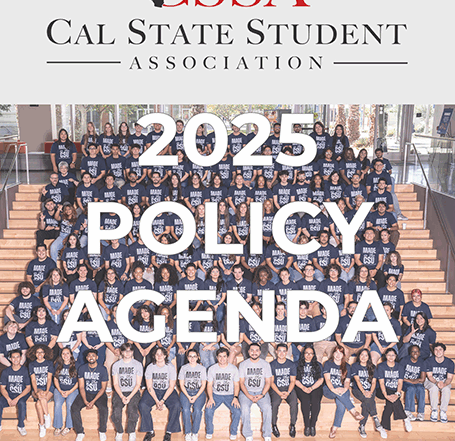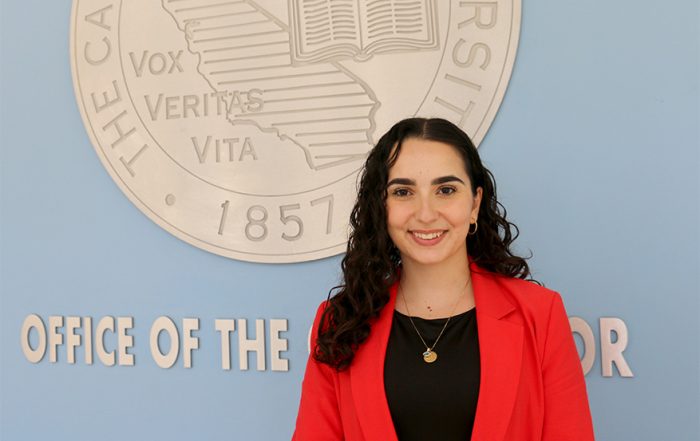
CSSA President Alferos’ Report to the CSU Board of Trustees
September 15, 2021
Thank you Chair Kimbell, and greetings to our Board of Trustees.
Before I begin, I would like to acknowledge the appointments of our new Trustees. I would like to personally congratulate Julia Lopez and Yammilette Rodriguez for their appointment, as well as the reappointment of Trustee Sabalius. I am excited to work with you all in our continual effort to create the model of higher education. I would also like to make a special acknowledgement and personal congratulation to the newest student trustee, Maria Linares. As someone who has worked alongside her in many different ways, and whose pathway to my current role would not have been possible without her advocacy, I know intimately the incredible advocate and organizer that Trustee Linares is, and am excited to see the legacy she creates here.
I would also like to take a brief moment of privilege to acknowledge the passing of one of our beloved former Board members. Breana Achie was a proud Seawolf who’s human centered advocacy on expanding mental health services was a catalyst not only for CSSA, but for my own personal advocacy. She served as a mentor and guide for me, and I feel it necessary to honor her legacy through the work we do, and honor the impact she made on all of our nearly half a million CSU students.
With that said, I am happy to report that these past 2 months have been productive for CSSA, and our students have been hard at work ensuring that no change in Higher Ed comes without our voice. In this, I would like to highlight for you all some efforts CSSA has taken on since my last report.
First, we at CSSA were excited at the announcement of the new CSUCCESS program. As you all know, the issue of digital equity is not new, but was one of the many basic needs exacerbated by our pandemic. As a fundamental issue of access, the digital divide lies squarely on the existing equity gap that plagues our system. The CSUCCESS program not only represents a targeted approach to addressing such a critical issue, it also presents the opportunity for the CSU to lead the nation in creating a more accessible and affordable education. I applaud Chancellor Castro for his leadership in this space and look forward to working alongside him, as well as our partners at Apple to ensure that CSUCCESS is simply a start to our ideal of a system that can provide critical technology to all of our students.
I would also like to applaud the Chancellor on his leadership in setting a systemwide COVID-19 Vaccination Policy. As we plan for the repopulation of our campuses and the return of our students, I am encouraged to see that we are working proactively to ensure that our campuses are safe and healthy learning environments. As a student, it is reassuring to know that our system centers the health and well-being of students like myself, but as President I am even more encouraged knowing that this decision is the result of months of planning and proactive consultation with CSSA and other systemwide stakeholders. Let this policy serve as a model of how we at CSSA can remain engaged as partners in thought, execution, and implementation going forward. With this, I cannot underscore enough how critical it is that we implement this policy with a fair and practical approach. I want to remind our systemwide and campus leadership that our students were immediate supporters of our transition to virtual learning at the beginning of this crisis. It was students that passed a COVID-19 Policy Agenda to set the standard for how we intended to keep each other safe. It was students who led campaigns encouraging masking and social distancing, and it was students who came out first in support of a vaccine policy. As a result, I feel it necessary to remind us to be cognizant of the implementation of our policy, so as to not target and threaten the same students who were and remain at the forefront of our efforts to keep our campuses safe. With this, I encourage all faculty and staff in our system to join our students as vital partners needed to ensure our campuses are safe and healthy environments ready to support student success
I also wish to briefly acknowledge the critical federal decision regarding DACA. As many of you know, the decision to halt new DACA applicants strikes the core of not just CSSA’s values, but also the vision of our CSU: to provide equitable and quality education. Our undocumented students know an unvarnished truth about our education system, one where the escalators to social mobility and conduits to economic development that are promised in our hallowed halls are so readily barred away from them. Through our nation’s politics around their identities, and our open discourse about supporting their “othered” status, higher education provides only a temporary and fragile home for the students at the forefront of our fight for equity. As put out in my statement, I would like to reiterate for both the Trustees and my students across the system: CSSA is fully committed to creating a just, equitable, and inclusive campus, one that is free of the erroneous barriers that our politics creates to bar any student from achieving what is readily given to those of us gifted the privilege of citizenship.
Additionally, we at CSSA have been working diligently to put together the beginnings of the next generation of our Policy Agenda. This Policy Agenda marks the inauguration of a new process for CSSA, one led by myself and our Associate Director Chris Woolett, and is in line with my personal commitment to advancing our organization’s strategic position in support of our students. This Policy Agenda is more focused, actionable, and better reflective of our student’s priorities for the next year. And as we finalize our agenda, I want to highlight a common commitment seen by our students to tackle the growing social inequities in our system: food, housing, mental health, campus safety, and digital equity.
Lastly, it is my goal in these reports to not only give you updates on the work of CSSA, but also to ground that work in the stories of our students. And it is in this moment that I am reminded of the lesson my father taught me: that love may be many different things to many different people, but it must always be accountable. And I love our system too much to not hold it accountable.
As I have made my rounds and spoken with our student leaders, I am continually inspired by the stories of all the great work they are doing. But my heart breaks at the stories of the struggles they face as well. I wish to share with you the story of a dedicated student who spent 2020 at the front lines of our crisis. This student spent their time outside of our classrooms working as an EMT, all while staying focused on their education through our virtual learning. And through this, they struggled with their mental health and receiving the support they needed.
I might also share with you a story of another student. This student is a passionate and dedicated change-maker who has committed years of their life serving their community both in and out of student government. As an advocate, they expanded the reach of ASI support services, connected student advocacy groups to the space of student government, and worked at the forefront of addressing our Basic Needs crisis. But this student’s work would be tested when they suddenly lost their housing. As someone who had spent years advocating for the support of students most in need, they never imagined themselves being the student who needed this same help.
I pose to you all a question then: How do we intend to center the health and wellbeing of our students if our leaders cannot support themselves in their efforts to advocate? Even further, how critical must these issues be for our students, that they endure homelessness, food insecurity, and trauma to continue to advocate for students who are even worse off?
Those of you who joined us for CSUnity heard me then, but I feel I must reiterate. It is here in the CSU that students are homeless. It is here in the CSU that students endure abuse. It is here in the CSU that students are harassed and profiled by law enforcement. And it is here in the CSU that those same students still choose to lead.
It is here, in our CSU system, where students face insurmountable adversity, carrying their own struggles, and still choose to take up the mantle of leadership. They are reminders that change we can believe in is only surpassed by change we can create, and their sincere and earnest efforts to build a system fit for their success is not only admirable, but inspiring.
And yet as admirable as their success is, we cannot diminish the impact of their struggle. Placated for their achievement, our student leaders have come to be known as determined, strong, and resilient. They are enduring, adaptable, and powerful, in the same way they are inspiring, dedicated change-makers. It is because of this that they have been called upon to support their fellow students, called upon by campus leaders, administrators, and fellow Trustees. But I must remind you that our students are not one-dimensional charactactures whose shoulders carry the weight of our present struggles. For every enduring and determined student leader is also exhausted and deprived. Every leader celebrated for their resiliency and adaptability must have equal support for their restlessness and fatigue. Students should not be celebrated because we can face the incessant onslaught of obstacles before us and still stand up, for we are human beings who should have never had to face those obstacles in the first place.
As we collectively work this year to tackle such critical social issues, we must confront the broken expectation in our logic. If we are to truly pride ourselves in our student diversity, if we are to celebrate, market, and/or highlight our diverse student backgrounds, we must do more than use our students as models for billboards, pamphlets, and advertisements. Students who are Black, Brown, queer, disabled, minoritized, and marginalized bring with them both the resilience and trauma of their community. For in this crisis, students are at the front lines supporting their fellow students, but that support cannot serve as a substitute for real, systemic change. Our students cannot stand-in to fill the gaps in our structural flaws because we find the notion of structural change too intimidating to take on.
But I do not bring this jeremiad without an honest hope. For as much as I see our present struggles, I have also met with leaders who restore my faith. For I firmly believe that, if there were a place to make these changes, it is here in the CSU. If there was a place that could excel beyond our current successes, an institution that could go beyond celebrating our diversity to creating transformative support systems for students, a system that could set the standard for the future of higher education, it is here in the CSU. For it is here in the CSU that student leaders seek to push past empty platitudes, looking to become partners in our policy making. It is here in the CSU that those same leaders are met by the proactive leadership of our Chancellor and systemwide leaders, who readily engage them on ways to make our campuses better. In my talks with Chancellor Castro, we remark that as much as University Presidents across the country look to our system to provide guidance through turbulent times, so too do student leaders from across the country look toward CSSA to inform their advocacy work. With this in mind, let us collaboratively work to create a system worthy of setting a guiding light for our nation to follow.
So I look forward to continually working with you all to do just that. I am excited to be working alongside the phenomenal leadership of my fellow executive officers, our Board of Directors, Chancellor Castro and our beloved student trustee’s Krystal Raynes and Maria Linares, to expand our strategic partnership and help forge the future of higher education. In doing so, I am confident that we can not only push through our present struggles, but also create a campus that gives home to all of our students.
That, Chair Kimbell, concludes my report.



